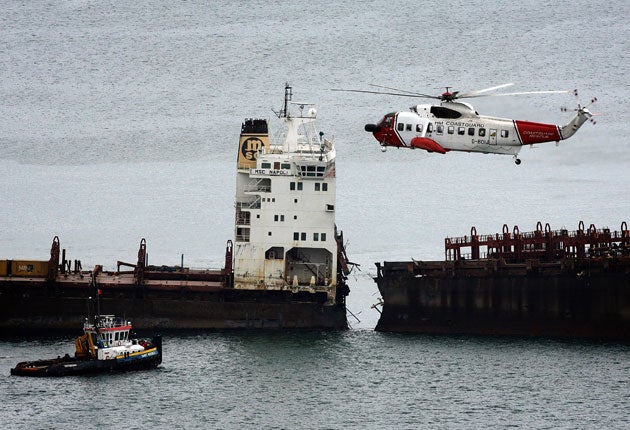Widespread cut in coastguards 'will cost lives'
The number of rescue centres is to drop from 19 to eight as distress calls rise

Lives could be lost at sea as a result of severe cuts to Britain's network of coastguard services, experts warned this weekend.
Only eight of the nation's 19 coastguard rescue centres, which co-ordinate the emergency services, are to remain, of which only three will stay open around the clock. A total of 226 out of 600 jobs are to be lost, to make savings of £80m by 2014.
The proposals have been met with predictions that closing centres, with the associated redundancies, will mean the loss of valuable local knowledge, increasing the risk to lives.
As Britain's waters become busier than ever, with an increase in shipping, more oil platforms, wind farms and tourists using coastal waters, experts argue that reducing the number of rescue centres could be fatal.
Coastguards responded to 22,000 callouts last year and made hundreds of rescues. Stornoway's rescue helicopter alone clocked up more than 200 callouts, its busiest year ever.
The Maritime and Coastguard Agency (MCA) said this weekend, however, that cuts are necessary and an overhaul of the service was "long overdue". The MCA chief coastguard, Rod Johnson said: "We do need local knowledge, but it's how that knowledge is used, in whom it's vested and how we share it. We will be taking the unquantifiable parochialism out of the equation."
But maritime experts say centralising coastguard stations risks throwing away local knowledge that cannot be replaced by technology. Kevin Hird, a guard from Brixham, in Devon, said: "Tourists in the summer months won't get the same response as they do currently, which will risk lives."
Critics also said the plans are already in serious jeopardy. It is believed that key players involved in the £6bn privatisation bidding process of the UK's search and rescue helicopter force may have been involved in the procurement process. If true, the Government may be forced to retender the contract.
The problem compromises the MCA's plans to provide 24-hour coverage of Britain's coastline with better helicopters. The current crop of ageing Sea Kings will now require extra-costly maintenance work to allow them to function properly.
Labour's Shadow Transport Secretary, Maria Eagle, said: "It's high time Liam Fox [Secretary of State for Defence] and Philip Hammond [Secretary of State for Transport] started working together to review the speed and scale of these ill-thought-out changes before they lead to a potential disaster off our shores."
Critics also argued that the scrapping of the RAF Nimrod maritime patrol aircraft, also used by the coastguard to perform long-range rescues in deeper water, illustrated the Government's desire to save money while disregarding risk or consequences.
In addition, a Lowestoft firm's multimillion-pound contract to supply emergency tugs around the British coastline is to be cancelled. Such a vessel refloated the grounded nuclear submarine HMS Astute off the coast of the Isle of Skye in October.
A select committee inquiry has been ordered next month where officials from the MCA are due to face tough questioning about their decisions. "If we don't get satisfactory answers we may well launch a bigger enquiry," said Louise Ellman MP, chair of the Transport Select Committee.
Additional reporting by Lucy Osborne
Join our commenting forum
Join thought-provoking conversations, follow other Independent readers and see their replies
Comments